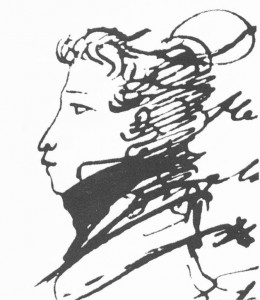Smithsonian Journeys: Russian Waterways Materials
Resources for Further Study
LIFE AND PRINCIPAL WORKS

Born: May 26, 1799 in Moscow
Education: Lyceum at Tsarskoe selo (The Tsars’ Village)
Exile to the South (Kishinev, Odessa, Mikhailovskoe): 1820-26
Influence during Exile: The Nanny–Arina Rodionovna (1758-1828)
Marriage: Natalia Goncharova in 1831
Duel: Georges d’Anthes, January 27, 1837
Died: January 29, 1837, at his St. Petersburg apartment on Moika 12, today the Pushkin Museum and Memorial Apartment
FAVORITE BIOGRAPHIES:
Walter Vickery. Alexander Pushkin: Revisited. Twayne Publishers, 1992.
Revised edition of Vickery’s succinct classic expose on the author. It proceeds through the poet’s biography and effortlessly introduces a general audience to the rich body of Pushkins Part of Twayne’s World Author Series.
T.J. Binyon. Pushkin. A Biography. Random House: New York, 2002.
Lengthy, prize-winning biography that garnered much attention. It would be a daunting place to start, but is intriguing for Pushkin lovers.
SELECTED WORKS
- LYRIC POEMS *Hundreds, including
I Loved You
The Prophet
Nightingale
- LONGER POEMS
Ruslan and Liudmila
The Bronze Horseman
Tales of the Tsar Sultan
- DRAMAS
Mozart and Salieri (one-act play)
Boris Godunov (full-length tragedy after Shakespeare)
The Stone Guest (tragedy–the Don Juan Story)
- SHORT STORIES
Queen of Spades
The Captain’s Daughter
Tales of Belkin
- NOVEL IN VERSE
Evgenii Onegin / Eugene Onegin
MORE ABOUT EVGENII ONEGIN (EUGENE ONEGIN)
Title: Evgenii Onegin, roman v stikhakh / Eugene Onegin, Novel in Verse.
Written between 1825 and 1831.
Length: Eight chapters (5541 lines). There are uncompleted stanzas as well, and various drafts. Scholars are constantly speculating on what he might have done with the material if he hadn’t been killed in the duel at such a young age.
RECOMMENDED ADAPTATIONS & TRANSLATIONS:
Film Version:
Onegin (1999)
Ralph Fiennes, Onegin; Liv Tyler, Tatiana. Marvelous adaptation, “approved” by many Russians. Biggest (and quite serious) flaw: casting Tatiana’s older, distinguished husband, as a young, romantic-looking man, obscuring entirely the real issues of her struggle to maintain her honor and commitment.
The Novel in Verse, in English:
Eugene Onegin. Translated by Walter Arndt. Woodstock, New York: Ardis Publishers, 2009.
Excellent, prize-winning translation with very good notes and critical articles.
Eugene Onegin. Translated by Charles Johnston. New York: The Viking Press, 1978.
A serviceable translation easily found in paperback and the source of the quoted sections below.
Eugene Onegin. Translated from the Russian with a Commentary by Vladimir Nabokov, Princeton: Princeton University Press, 1975; 2nd edition, 1991.
This edition is in two volumes. The smaller one, Volume 1, contains the novel in verse in English and Russian. A much bigger Volume 2 presents an astonishing, detailed, kaleidoscopic commentary (in English by the writer Valdimir Nabokov, best known in USA as the author of Lolita. The commentary volume serves as an unbelievably, intriguing “insider’s guide” to the world of Onegin, and, by extension, the world of Pushkin. It will teach you Pushkin’s era inside and out! Nabokov proceeds section by section, sometimes line by line or word by word, to explain the nuances and dynamism of Pushkin’s genius and wit.
SECTION III EUGENE ONEGIN—DESCRIPTIONS OF PERSONNAE
(Johnston Translation)
Olga, younger Larin daughter, engaged to Lenskii (a mezzo in Tchaikovsky’s opera)
Full of obedience and demureness,
as gay as morning and as clear,
poetic in her simple pureness,
sweet as lover’s kiss, and dear,
in Olga everything expresses
the sky blue eyes, the flaxen tresses,
smile, voice and movements, little waist
take any novel, clearly traced
you’re sure to find her portrait in it:
(Chapter 2/XXIII)
Tatiana, older Larin daughter and heroine of story
Truly
she lacked her sister’s beauty,
lacked the rosy bloom that glowed so newly
to catch the eye and to attract.
Shy as a savage, silent, tearful,
wild as a forest deer, and fearful,
Tatiana had a changeling look
in her own home.
(Chapter 2/XXV)
Vladimir Lenskii, Olga’s fiance
He sang of love, to love subjected,
his song was limpid in its tune
as infant sleep, or the unaffected
thoughts of a girl, or as the moon
through heaven’s expanse serenely flying
that queen of secrets and of sighing.
(Chapter 2/X)
Evgenii Onegin, Lenskii’s Friend and the Protagonist
How early on he learnt to trouble
the heart of the professional flirt!
When out to burst a rival’s bubble,
how well he knew the ways to hurt –what traps he’d set him, with what malice
he’d pop the poison in his chalice!
But you, blest husbands, to the end
you kept your friendship with our friend:
(Chapter 1/XII)



